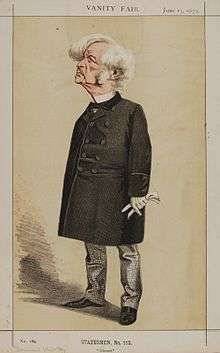Samuel Morley (MP)

Samuel Morley (15 October 1809 – 5 September 1886), was an English woollen manufacturer, philanthropist, dissenter (Congregationalist), abolitionist, political radical, and statesman.
Introduction
Samuel Morley was the youngest son of a manufacturer with premises in Nottingham and a warehouse and offices in London. Born in Homerton, at an early age he worked for his father's business in London. When his father and brothers chose to retire, he was left in managerial control. By 1860 he was sole owner of both the London and Nottingham parts of the business, and as it grew rapidly into the largest of its kind in the world he became very wealthy, and a model employer.
Morley took a large residence in Stamford Hill, Stoke Newington when not living at his City of London address. He was a member of Thomas Binney's King's Weigh House Congregational Chapel in Fish Street Hill, London.
He ventured into publishing, becoming one of the proprietors of the 'Daily News', the main Liberal paper of the period. By reducing its price, its losses turned to gains and carried greater influence.
As a Liberal, he was one of Gladstone's keen supporters, and was elected as an MP for Nottingham in 1865, and later Bristol (1868–85).
In later life he became a strong advocate of temperance.
Philanthropist and educationalist
Sometimes called ‘The Philanthropic Merchant’, he was sufficiently eminent to be caricatured in Vanity Fair (15 June 1872). A contemporary biographer, writing in the ‘Annual Register of World Events’, considered that he would be remembered by posterity as one of the leading merchant princes and philanthropists of the century.
Amongst Morley's many philanthropic ventures, at least one continues to make an important contribution to London life today - Morley College - which he endowed for adult education. In his day, he was also treasurer of Homerton College, chairing its inauguration on 20 April 1852 as the new 'Training Institution of the Congregational Board of Education', following purchase, extension and rebuilding on the site of the old mansion and buildings of Homerton Academy.
Abolitionist
As an abolitionist, a cause closely associated with nineteenth-century Whigs, political radicals and their subsequent British Liberal party, Morley became treasurer of the fund to finance Josiah Henson, an escaped American slave who was given support in Britain. Josiah Henson later wrote Uncle Tom's Story of His Life: an Autobiography of the Rev. Josiah Henson (Mrs. Harriet Beecher Stowe's 'Uncle Tom'), from 1789 to 1876. This contained an introductory note by 'George Sturge & S. Morley, Esq., M. P.' and a preface by Harriet Beecher Stowe. In his autobiograohy, Josiah Henson records,
- I received numerous tokens of regard from many philanthropic gentlemen while I was in London, which I shall never forget; but I was particularly touched by the special kindness of Samuel Morley, Esq., and George Hitchcock, Esq., of St. Paul's Churchyard. These two gentlemen invited me to dine with them every day.
Marriage
Morley married Rebekah Maria Hope, daughter of Samuel Hope of Liverpool. Their eldest son Samuel became Governor of the Bank of England and was elevated to the peerage as Baron Hollenden in 1912. Their younger son was the Liberal politician Arnold Morley.
Death and Memorial
There is a statue to Samuel Morley in Bristol, and a second memorial above his place of interment in Dr Watts' Walk, Abney Park Cemetery, Stoke Newington, London. The latter is designed with elegant simplicity, as a large raised tomb, with a plain pediment to each end for nonconformists, even those as wealthy as Samuel Morley, generally resisted ostentatious memorials.
A bust of Morley is to be found at the Waverley Street entrance to The Arboretum, Nottingham with lettering beneath his likeness describing him as an MP, merchant and philanphropist.
A Primitive Methodist chapel was erected in 1889 in Blue Bell Hill, Nottingham, and named in his memory the Morley Memorial Chapel.
References
- Hinton, R.J. (1875) Brief Biographies: English Radical Leaders, New York: Puttnams' Sons
- Hodder, Edwin (1887) Life of Samuel Morley, London: Hodder & Stoughton
 Lee, Sidney, ed. (1893). "Morley, Samuel". Dictionary of National Biography. 36. London: Smith, Elder & Co.
Lee, Sidney, ed. (1893). "Morley, Samuel". Dictionary of National Biography. 36. London: Smith, Elder & Co. - Kidd, Charles, Williamson, David (editors). Debrett's Peerage and Baronetage (1990 edition). New York: St Martin's Press, 1990,
- Leigh Rayment's Historical List of MPs
External links
- Hansard 1803–2005: contributions in Parliament by Samuel Morley
| Parliament of the United Kingdom | ||
|---|---|---|
| Preceded by Charles Paget Sir Robert Juckes-Clifton |
Member of Parliament for Nottingham 1865–1866 With: Sir Robert Juckes-Clifton |
Succeeded by Ralph Bernal Osborne Viscount Amberley |
| Preceded by Francis Berkeley John William Miles |
Member of Parliament for Bristol 1868–1885 With: Francis Berkeley 1868–1870 Elisha Smith Robinson 1870 Kirkman Daniel Hodgson 1870–1878 Lewis Fry 1878–1885 |
Constituency abolished |